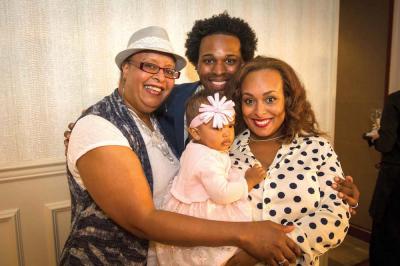October 22, 2015
 Elizabeth Rhodes, left, with her son-in-law Hashim Lafond, granddaughter Anaiah Lafond, and daughter Johnetta Lafond at Boston Medical Center’s Catwalk for Cancer Care fundraiser. Rhodes has battled breast cancer twice in her life. She credits her survival to early detection through a mammogram in 1994. Photo courtesy Atlantic Photo - BostonIt was a split-second decision that saved Beth Rhode’s life.
Elizabeth Rhodes, left, with her son-in-law Hashim Lafond, granddaughter Anaiah Lafond, and daughter Johnetta Lafond at Boston Medical Center’s Catwalk for Cancer Care fundraiser. Rhodes has battled breast cancer twice in her life. She credits her survival to early detection through a mammogram in 1994. Photo courtesy Atlantic Photo - BostonIt was a split-second decision that saved Beth Rhode’s life.
After leaving a Saturday church service in the South End, the then-42 year old Dorchester resident saw a mammography van set up in the parking lot outside. Even though she herself was a nurse at Boston City Hospital, Rhodes was skeptical that she should take a few minutes to get herself checked.
“I really thought, ‘I’m 42, there’s nothing wrong me,” she recalled. I don’t need to have a mammogram.’ But you know, the van was there and everyone was doing it, so I did it, and it was lucky that I did. I think God sent the van to me that day.”
The test that day in 1994 detected a mass in her breast. Further tests at Boston Medical Center confirmed that she was living with stage-two cancer. A single parent raising her five year old daughter and battling cancer and facing chemotherapy and radiation treatment, Beth lacked the support system she needed in the mid-1990s.
“It was rough because my daughter and I were living here by ourselves, my brothers and sisters were in different states. I felt alone because there weren’t any support groups, but I had a very good friend who let my daughter stay with her family, and now they are like family to my daughter and me,” she said.
Beth beat the cancer through radiation. But the illness came back and in 2012, she underwent a double-masectomy. This time, Beth leaned on a support group for cancer patients that is now in place at Boston Medical Center. The group offers discussions, social activities, patient navigation, and complimentary services to those in both treatment and recovery.
“The group is very welcoming. The new members can ask us about their symptoms and what they can expect from treatment,” Rhodes explains. “I remember a day the group was able to go to Elizabeth Grady. They let my daughter come with me, so we were able to bond and spend the day together. We got a full body and facial massage, had a gourmet lunch, and got a gift bag to take home. It was one of the most awesome days I have ever had and I got to spend it with my daughter.”
Beth urges women to get tested early.
“You have to get your mammogram,” she advises. “Have a relationship with your doctor. You do not want to go in and find a new diagnosis and be left with strangers. You need to have people that care about you because early diagnosis is the key to surviving.”
In terms of the relationship with the doctor that Rhodes advises, attention will certainly be paid to the revised guidelines on mammography issued by the American Cancer Society this week, which maintain that women of average risk of breast cancer can wait until they’re 45 to have a first mammogram and should have them every year until age 55, and then start having them every other year.
In addition, Beth is a firm believer in taking care of the mind, body, and soul. She started a rowing club and uses meditation to relax and stay connected. Her physician— Dr. Rita Blanchard — knew her even before her original diagnosis in 1994.
“I knew [Beth] beforehand because she was a nurse at the old Boston City Hospital,” explains Dr. Blanchard. “She was head nurse so I knew her for 10 years before she was diagnosed with breast cancer. I think you know, she is a very grounded sort of person and very calm, actually, even when she was re-diagnosed. I was always impressed by the fact that she really did take it one step at a time and seemed to have a great poise.”
As an Oncologist, Dr. Blanchard advises, “Breast Cancer can be dependent on a number of things, look at family history and other risk factors. Get a mammogram early.”
The technology has changed drastically since Beth was first diagnosed in 1994. It has grown from a “flattening technique” to an ultrasound or MRI of the breast.
Dr. Blanchard says “tremendous strides” have been made to improve technology and treatment for the patients so the process is a little more comfortable.
“Cancer is not a death diagnosis anymore,” Rhodes says. “You can survive, thrive and live beyond cancer. You can be treated and you can come through healthy and be well on the other side, there are a lot of programs that you can participate in like the Livestrong program at the Y, which helps you to get strong after chemo, and things like Reiki which can really relax you throughout chemo.”
For more information about Boston Medical Center’s Cancer Support Services, visit bmc.org/cancer-center/cancer-support-services.htm.


